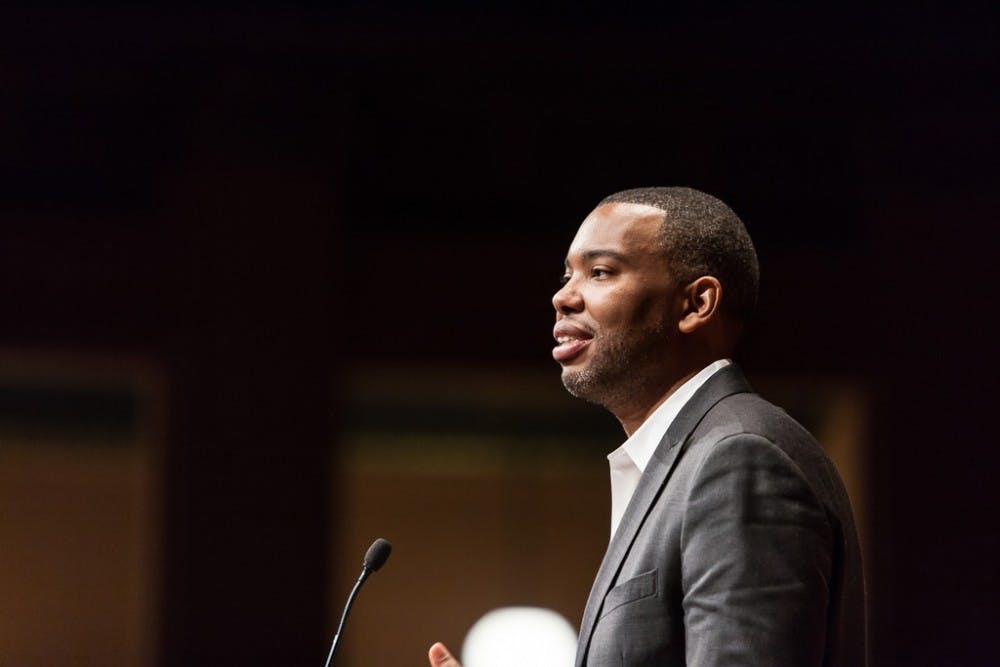In his recent conversation with Professor Keeanga-Yamahtta Taylor of the African-American Studies department, Ta-Nehisi Coates, an author and former national correspondent for The Atlantic, made a strong distinction between writing and activism.
While Coates emphasized that he shared the same goals and assessments of society as Black Lives Matter — an organization for racial justice — he said he could never claim to be a member of the activist movement.
Instead, Coates maintained he valued the separation of the writer from the activist. A writer, he said, stands resolutely at a distance, thinking freely and developing a consciousness independent from external socio-political movements. As a writer, according to Coates, one is only obligated to think for oneself and robustly communicate those convictions.
Coates has established himself as one of the most prolific writers of our time, but I must push back on his separation of the writer from the activist. Coates’s engagement with the world, his willingness throughout his career as a writer to grapple deeply with the problems of our time, and his powerful critiques of our society are wholeheartedly and forcefully the work of an activist.
Activism represents the struggle for truth, justice, and authenticity. It is the persistent searching in the void of darkness for the light of progress, change, and equality. In this sense, the work of the writer — a writer much in the vein of Coates — is one of the most meditative and profound works of activism.
While Coates himself defined activism — through references to Black Lives Matter and the Black Panther Party — as the conventional and professional struggle for power and policy-change in society, I would urge for a more universal understanding.
I hope to go beyond Coates’s view and convey the importance of the writer as an activist. I am not simply concerned with showing my disagreement with Coates’s view but rather about demonstrating the deeply pertinent and essential idea of activism at the core of works of art and writing.
Activism is the quest for progress within a system that seeks to prevent this forward movement.

Historically, writers have worked alongside activists — fostering change, advocating for justice, and championing progress toward something better, something more inclusive, and something aspiring to the heights of human ideals. More than the beauty of words and ideas, writing is powerful — it provokes, inspires, and effects change. To write and create today is an inherently political undertaking — an undertaking that stands up for humanity in the face of a discouraging reality that works to strip the human of individuality and creative agency.
Albert Camus, the 20th-century Algerian writer and philosopher, exemplified the ideals of this sort of engaged writer. Through his writing, Camus demonstrated his understanding of the essential nature of dealing with the most important questions and most pressing causes of the time. More deeply, though, he realized the role of the artist is “to create dangerously” in the face of inequality, evil, and injustice. In 1957, Camus was awarded the Nobel Prize in Literature “for his important literary production, which with clear-sighted earnestness illuminates the problems of the human conscience in our times.”
In Camus’s view, “The artist can neither turn away from his time nor lose himself in it.”
For Camus, it was the scourge of a nuclear arms race between the United States and the Soviet Union, the chaos of a postwar world, and the Algerian war for independence — along with other postcolonial independence movements across the world — that demanded the power of the writer.

Today, a long list of worldwide crises has replaced those of the 20th century: the current backsliding of democracy; increased authoritarianism, hatred, and exclusion; and the ongoing scourges of violence and atrocity in Syria and Yemen. While some may ideologically disagree with Camus, he undeniably engaged with the world around him and advocated for the causes he believed in.
All in all, my disagreement with Coates stems from an appreciation of the engaged writer’s craft as a form of activism. I see the writer’s role in society as a truth-teller, advocate, and, in turn, an activist. Especially in times much like today when not only the United States but also the entire world is rocked by waves of hatred, bigotry, backlashes to liberal democracy, endless warfare, and a breakdown of basic ideas of cooperation, the writer’s role is as grave and as fundamental as ever.
In many ways, I see Coates as a writer in this vein, one who stands up to the most egregious realities of our American experience and the most harrowing inequalities felt by black Americans — not only now but since the founding of this country. Therefore, I value his voice as one engaged with the most pressing realities of our moment, and I value his role within our current world as an activist.
I respectfully disagree with his distinction between writers and activists because I believe many — myself included — hail Coates (and other scholars like him) as a writer who advocates for the causes and ideas most impactful to American life.
Writers such as Coates are involved in the tides of activism felt in our country and throughout the world.
To speak up, to engage, and to grapple directly with the evils of society are more pressing now than ever before, and it lies with those who choose to write, create, imagine, and produce in troubled times to encourage a belief in a changed world that is more human and inspiring.
The writer is one who refuses to be silenced, who continues to carry the powerful and illuminating justice of the written word forward in the face of opposition.
Kaveh Badrei is a junior Wilson School concentrator from Houston, Texas. He can be reached at kbadrei@princeton.edu.








